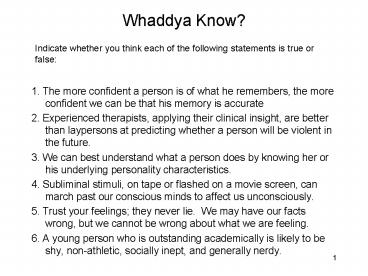Whaddya Know
1 / 26
Title: Whaddya Know
1
Whaddya Know?
Indicate whether you think each of the following
statements is true or false
- 1. The more confident a person is of what he
remembers, the more confident we can be that his
memory is accurate - 2. Experienced therapists, applying their
clinical insight, are better than laypersons at
predicting whether a person will be violent in
the future. - 3. We can best understand what a person does by
knowing her or his underlying personality
characteristics. - 4. Subliminal stimuli, on tape or flashed on a
movie screen, can march past our conscious minds
to affect us unconsciously. - 5. Trust your feelings they never lie. We may
have our facts wrong, but we cannot be wrong
about what we are feeling. - 6. A young person who is outstanding academically
is likely to be shy, non-athletic, socially
inept, and generally nerdy.
2
Chapter 1Testing Our Ideas
- Research tests our ideas and improves them
- Science tests conclusions against facts
- Different than appeals to authority, common
sense, personal experience or intuition - Problem Fraudulent, Bad, or No research at all
- Research Consumers vs. Scientists
- Applied and Basic Research
3
Look See
- Yellow Fever example
- Autism
- How do ideas change?
4
What Do We Think and Why?
- Sea of Information
- How do we tell whether something is true?
- Ask What is this claim or conclusion based on?
5
If you are told something is so, ask
- How do you know? Or why do you think so?
- IF you get an answer (reasons) then ask Are the
reasons good reasons?
6
Ways of Knowing--Backing up what we say (Reasons)
- Authority
- Common Sense
- Personal Experience
- Intuition
7
Authority
- So and so says its so and he/she ought to know
- My mother saidmy father saidthe experts say
- Scientists sayResearchers say
8
Common Sense
- Everybody knows
- Its obvious
9
Common Sense
- 1. The more confident a person is of what he
remembers, the more confident we can be that his
memory is accurate - 2. Experienced therapists, applying their
clinical insight, are better than laypersons at
predicting whether a person will be violent in
the future. - 3. We can best understand what a person does by
knowing her or his underlying personality
characteristics. - 4. Subliminal stimuli, on tape or flashed on a
movie screen, can march past our conscious minds
to affect us unconsciously. - 5. Trust your feelings they never lie. We may
have our facts wrong, but we cannot be wrong
about what we are feeling. - 6. A young person who is outstanding academically
is likely to be shy, non-athletic, socially
inept, and generally nerdy.
10
Personal Experience
- Its true if it fits my experience
- I dont agree with that. It doesnt fit my
experience.
11
Problems with Personal Experience
- Problem of sampling bias
- Problem of Observer bias
- Problem of Confounded Variables
12
Intuition
- I just know that this is true
- But what about my intuition versus yours
- Whose intuitions do we trust?
- Intuition and Scientific thinking are not
incompatible
13
How do you know? Or Why do you think so?
- So and so says its so and she ought to know
- Everyone knows that
- My Experience tells me that
14
How does a scientist know or justify conclusions?
- A conclusion is established that has been tested,
not once but many times against established facts - Tested under conditions that could have shown it
to be false (Falsifiability Criterion) - Conclusions always tentative gt So far
15
Built-in Error Correction
- The strength of the Scientific Method
- This is what makes science unique
- Permits us to know when we are wrong
16
A General Principle
- If we test our ideas, we can know when we are
wrong. And if we know when we are wrong, we can
correct our mistakes.
17
So, if we ask a scientist Why do you think so?
- Because the idea has been tested against the
facts and stood up to the test - Because of research that has demonstrated such
and such
18
Okay, conclusions based on tests, but
- Are the scientists reasons good ones?
- Were the tests (studies) good tests?
- Were these tests designed properly
- Were the tests really tests of your conclusions
at all? - Problem of adequate tests and what conclusions we
can draw from them
19
Life would be simple if
- One could assume that all research is good
research - When someone says Studies show
- The studies exist and that they do in fact
show - Unfortunatelyits not that simple
20
Research Good, Bad, and Bogus
- Fraudulent Research
- Subliminal Advertising
- Incompetent Research
- Autism research
- Therapeutic success stories
- Self-help books
21
Why Study Research Methods?
- Research Producers Scientists
- Research ConsumersProfessionals
- Everyone
- Problems and pitfalls of research
22
Basic versus Applied Research
- Basic Research--goal of understanding--basic
principles underlying class of events - Applied Research--practical problem in mind
- Cross Talk
23
The Research Adventure
- Critical Eye--practical benefits
- Interesting
- Detective story, a mystery to be solved
24
SATs on the way Up?
25
Gene Links Stress, Depression
26
Coffee Good For You



























![❤[READ]❤ 50 Things to Know about Screenwriting : Expert Insights & Essential Techniques](https://s3.amazonaws.com/images.powershow.com/10079483.th0.jpg?_=20240716116)



